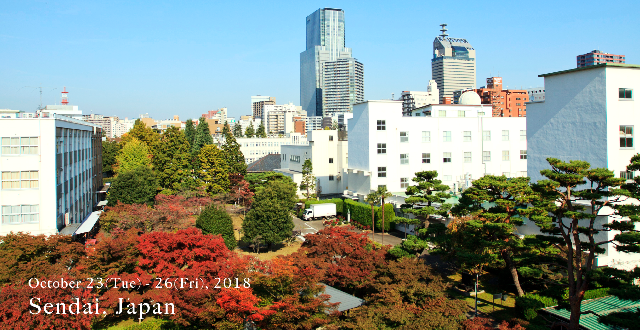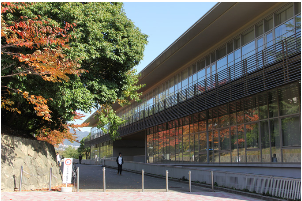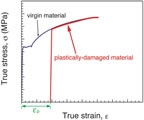| 1. Advanced Visual Testing Technologies for In-Vessel Inspection |
|
Yoshinori Satoh1), Jun Suzuki2), Toru Ootsubo2)
1) Power and Industrial systems R&D Center,
2) Isogo Nuclear Engineering Center,
Power Systems Company, Toshiba Corporation
July 26, 2009 |
| 2. Background
|
| |
 In-Vessel Visual Inspection (IVVI) as ISI based on the JSME S NA1–2004 :The following reactor internals is inspected by VT-3 for the standard inspection; In-Vessel Visual Inspection (IVVI) as ISI based on the JSME S NA1–2004 :The following reactor internals is inspected by VT-3 for the standard inspection;
»Core Shroud;
»Jet pump;
»Shroud support;
»Top guide, Core plate and so on.
 Individual Inspection for reactor internal is also needed; Individual Inspection for reactor internal is also needed;
»Inspection for stress corrosion cracking;
»Long interval compared to standard inspection (ex: 10years, 25years)
»EVT-1 should be used for the individual inspection;
 Enhancement of NDE technique is required; Enhancement of NDE technique is required;
»Advanced VT technique to achieve high accuracy;
»ECT or Laser-UT as alternative inspection for visual;
»High accuracy Ultrasonic testing (PA UT technique); and,
»Delivery and positioning technique. |
| 3. Overview of TOSHIBA IVI Technologies |
| |
 Phased Array UT Phased Array UT
»High accuracy flaw depth sizing on weld surface by immersion technique.
 Laser UT & ECT Laser UT & ECT
»High resolved flaw detection and length & depth sizing in the reactor water.
 Advanced VT Advanced VT
»Super Resolution VT system
»3D VT system |
| 4. Phased Array UT |
| |
 Principle Principle
Ultrasonic beam is steered and focused by phase controlled excitation of multiple array elements
 Feature Feature
● Real time B-scan image carried out for objective region
● Inspection condition can be changed according to defects and objective components
● Focused longitudinal wave is effective for inspection of welds
● Immersion technique is not affected to the surface condition |
| 5. Laser UT – PWR BMI
|
| 6. Remotely Operated Vehicle (ROV) - Lineup |
7. ROV - Features
|
|
- Applicable to in-vessel inspection and pool inner wall inspection with highly accurate positioning capability.
 Shroud ROV Shroud ROV
・Accessible to 55 mm and more;
・Demonstrated to EPRI;
・Multi purpose use attaching various head (e.g. UT and Brushing).
 Shroud Support ROV Shroud Support ROV
・Drive below baffle plate
・Demonstrated to EPRI;
・Multi purpose use attaching various head (e.g. UT and Brushing).
 Small Vehicle Small Vehicle
・Approximately Dia. 140mm (Main body);
・Accessible to entire surface to be inspected;
・Demonstrated to EPRI;
・Manual operation;
・Stable by touching wheels on target. |
| 8. Operating Experience |
| 9. Advanced VT Technologies |
| 10. Requirement for VT technologies |
| |
 Visual Testing (VT) for IVI Visual Testing (VT) for IVI
・ VT is usually performed as “indirect” visual inspection using remote cameras because target objects are under water and in high radiation area.
・ Inspectors detect cracks on surface of internal structures on the monitor. |
| 11. Requirement for VT technologies |
| |
 Visual Testing (VT) for IVI Visual Testing (VT) for IVI
 Motivations Motivations
・Simplifying adjustment works
・Enhancing visibility on the monitor
・Providing intuitive visual interface |
| 12. Super Resolution Technique |
|
 Example result of Super Resolution processing Example result of Super Resolution processing |
| 13. Overview of Super Resolution Technique |
|
 Principle of SR Principle of SR |
| 14. Overview of Super Resolution Technique |
|
 Effects by applying Super Resolution (SR) Effects by applying Super Resolution (SR)
- SR can make higher resolution images from a low resolution video. This behavior is equal to making camera close to objects. → SR can reduce difficult camera adjustment works such as making cameras close to objects in narrow space. In other words, SR can reduce VT time.
- SR can be performed without expensive hardware but with software. → It can prevent from increasing in cost.
- SR can enhance the resolution of VT video ONLY from frames in the video without additional information.→ SR has applicability to visual inspection activities.
|
| 15. Overview of Super Resolution Technique |
|
 Algorithm construction for Super Resolution Imaging System Algorithm construction for Super Resolution Imaging System |
| 16. Experimental Results |
|
 Experimental Configuration Experimental Configuration |
| 17. Experimental Results |
|
Case 1
 SCC Test Piece SCC Test Piece
 Condition Condition
- Working Distance: 195mm
- Field of View: 50mm×38mm
- Resolution: 70μm/pixel |
| 18. Experimental Results |
|
- Raw Video (Part of Test Piece)
- SR image (Part of Test Piece)
SR processing can enhance the crack in higher resolution |
| 19. Experimental Results |
|
Case 2
 Cylindrical Test Piece Cylindrical Test Piece
 Condition Condition
- Working Distance: 293mm
- Field of View: 100mm×75mm
- Resolution: 156μm/pixel |
| 20. Experimental Results |
|
- Raw Video (Part of Test Piece)
- SR image (Part of Test Piece)
SR processing can enhance thin wire in higher resolution. |
| 21. Experimental Results
|
|
Case 3
 Cylindrical Test Piece Cylindrical Test Piece
 Condition Condition
- Working Distance: 586 mm
- Field of View: 150mm×113mm
- Resolution: 234μm/pixel |
| 22. Experimental Results |
|
- Raw Video (Part of test piece)
- SR image (Part of test piece)
SR processing can enhance thin wire in higher resolution. |
| 23. Applicability Evaluation |
|
 Quantitative Evaluation of Super Resolution (SR) Quantitative Evaluation of Super Resolution (SR)
In order to evaluate applicability of SR “quantitatively”, we conducted visibility evaluation based on VT-1 grade of ASME.
※ VT-1 must be demonstrated capable of resolving characters whose height is 1.1mm. |
| 24. Applicability Evaluation |
|
 Definition of Quantitative Visibility Definition of Quantitative Visibility
For the evaluation, we compare the visibility of the characters on Super Resolution (SR) images to that on raw videos.
Visibility

Readability: Ratio of the number of VT-1 characters which 3 examiners could read to the number of all test characters.
Readability (%)
= (Number of characters which examiners could read)
/(Number of all test characters)×100(%) |
| 25. Applicability Evaluation |
|
 Experimental Configuration Experimental Configuration
(a) Comparing readabilities while changing working distance
(b) Comparing readabilities while changing scanning speed |
| 26. Applicability Evaluation |
|
- Comparison result while changing WD when scanning speed is 10mm/sec |
| 27. Applicability Evaluation |
|
- Comparison result while changing scanning speed when WD=200mm |
| 28. Applicability Evaluation |
|
 Summary of evaluations Summary of evaluations
We can confirm that the use of the Super Resolution (SR) brings the following effects.
- It will be able to become easier and more flexibly to set the working distance of cameras in VT because SR can give nearer images with software.
- SR will be able to prevent camera motions from reducing visibility on monitor. |
| 29. 3DVT Technique |
|
3-dimensional VT (3DVT) technique is based on Stereo vision.
 Some information can be provided … Some information can be provided …
(1) Crack length and etc. on 3D path
(2) 3D shapes (wire-frame, surface and texture model)
(3) Cross-section view on reconstructed object surface
 Main Processes are … Main Processes are …
(1) camera calibration (relative camera position and angle)
(2) image matching of 2 images from each camera
(3) 3D-coordinates calculation using image pixel and camera parameters
|
| 30. Overview of 3DVT Technique |
|
 Configuration of this system with 3D camera head, control device and processing device: Configuration of this system with 3D camera head, control device and processing device:
- 3D Camera head is consist of 2 camera and rotating table.
- Control Device is for signal communication and operation.
- Processing Device perform image processing, calibration and 3D-measurement process. |
| 31. 3D Camera for Flat Target |
| 32. 3D Camera for Flat Target |
|
 Configuration of 3D Camera Head Configuration of 3D Camera Head
 Surface Shape Measurement Result Surface Shape Measurement Result |
| 33. 3D Camera for Pipe Target |
|
 Measurement target Measurement target
(1) Welding part of CRD Housing and CRD stub tube (J-weld)
(2) Welding part of CRD stub tube and RPV (3D-weld)
In order to measure welding part of CRD stub tube …
 Restricted conditions Restricted conditions
(1) To mount on access device for being possible to scan and measure
(2) To able to access and measure in a narrow space
(3) To fix working distance (250mm in air)
|
| 34. 3D Camera for Pipe Target |
|
 Configuration of prototype measurement head Configuration of prototype measurement head
Camera: 640x480pixels, 1/4 inch (6.4mm) CCD
Head Size: 50mm(L)x70mm(W)x30mm(D)
Measurement accuracy (depth): 0.5mm
|
| 35. 3D Camera for Pipe Target |
|
 Results of Mockup Experiment Results of Mockup Experiment
Both welding parts (J-weld and 3D-weld) of the Mock-up were able to be measured surface shape of welding part.
We can confirmed that our 3DVT technique and prototype measurement head were effective.
|
| 36. Flexible 3D Camera System |
|
 Main functions Main functions
Covering from micro measurement (crack length) to macro measurement (position, distance, level of internal structure) for Jet-pump
 Specifications Specifications
(1) Measurement accuracy (depth): 0.5mm (WD= 100mm), 5.0mm (WD = 600mm);
(2) Field of view: 100x75mm or more
|
| 37. Flexible 3D Camera System |
|
 Remarkable points Remarkable points
(1) Working distance is variable change as rotating camera
(2) Cross point of optical axis is adjusted most suitable angle automatically
(3) Size measurement covering from tiny crack to large structure
(4) Measuring distance on 3D path and direct distance between 2 points
|
| 38. Flexible 3D Camera System |
|
 Example of 3D measurement (Main GUI) Example of 3D measurement (Main GUI)
|
| 39. Flexible 3D Camera System |
|
 Example of 3D measurement using zoom Example of 3D measurement using zoom
A measurement result of a test piece which has welding part (Working Distance: 350mm)
|
| 40. Flexible 3D Camera System |
|
 Applicability Evaluation of Flexible 3D Camera Applicability Evaluation of Flexible 3D Camera
A measurement result of a test piece which has welding part (Working Distance: 350mm)
|
| 41. Applicability Evaluation of Flexible 3D Camera |
|
 Applicability Evaluation of Flexible 3D Camera Applicability Evaluation of Flexible 3D Camera
In order to verify applicability of this 3D VT system, we performed 3D measurement for the surface of Jet pump mock-up in full scale tank.
|
| 42. Flexible 3D Camera System |
|
 Measurement Result of Jet Pump Mock-up Measurement Result of Jet Pump Mock-up
We can confirm that the profile (cross-section) data on the Jet Pump surface was obtained along cylindrical surface. |
| 43. Flexible 3D Camera System |
|
Downsizing of proto-type 3D Camera head for narrow space
|
| 44. Flexible 3D Camera System |
|
- Developed the prototype measurement system by the 3DVT technique for shape reconstruction and crack length measurement.
- Result of std. is less than 0.5mm (measurement resolution in design).�Confirm to able to measure difference in level of 0.5mm.
- Conducted mock-up experiment for demonstrating the effectiveness of 3DVT technique and the applicability of prototype measurement head of this system using simulated test piece of actual equipment shape.
|
| 45. Conclusion |
|
Toshiba has various advanced NDE technologies, such as phased array UT and Laser-UT, and widely applies these technologies to actual in-vessel inspections for nuclear power plants.
In particular, distinctive VT technologies have been developed;
- Super resolution (SR) VT enables to produce a still image having 3 times better resolution from original low-resolution video data.
- 3-dimensional (3D) VT enables to quantitatively reconstruct object shapes with an accuracy of 0.5mm.
|






